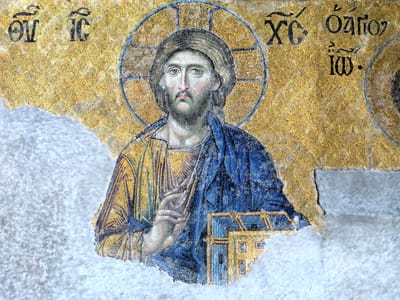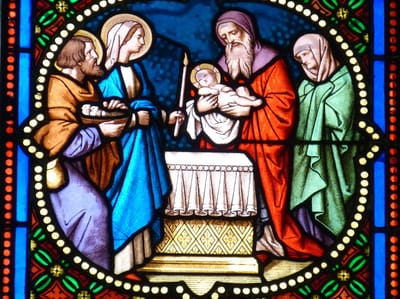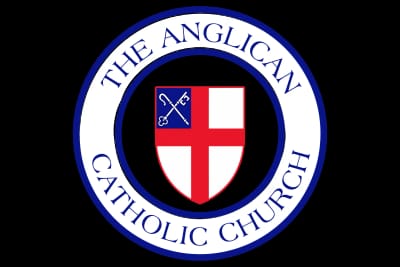OUr Belief
As formulated and adopted by the Early Church in the Nicene Creed

And in one Lord Jesus Christ, the only-begotten Son of God; Begotten of his Father before all worlds, God of God, Light of Light, Very God of very God; Begotten, not made; Being of one substance with the Father; By whom all things were made: Who for us men and for our salvation came down from heaven, And was incarnate by the Holy Ghost of the Virgin Mary, And was made man: And was crucified also for us under Pontius Pilate; He suffered and was buried: And the third day he rose again according to the Scriptures: And ascended into heaven, And sitteth on the right hand of the Father: And he shall come again, with glory, to judge both the quick and the dead; Whose kingdom shall have no end.
And I believe in the Holy Ghost, The Lord, and Giver of Life, Who proceedeth from the Father and the Son; Who with the Father and the Son together is worshipped and glorified; Who spake by the Prophets: And I believe in one Holy, Catholic, and Apostolic Church: I acknowledge one Baptism for the remission of sins: And I look for the Resurrection of the dead: And the Life of the world to come. Amen.
Our Sacramental Life
The Covenantal Middle Path - The Anglican Way "Ye shall observe to do therefore as the LORD your God hath commanded you: ye shall not turn aside to the right hand or to the left." (Deut. 5:32)

Our History
The Anglican Catholic Church
We are a “Continuing” Anglican Church because we continue to live and practice the fullness of the Christian Faith in its unique English form — English Catholicism — which has been present in England since the early second century. We can trace the term “Anglican” back to the ancient Anglo-Saxon tribes of Europe. The tribal name was spelled “Engles” or “Angles,” as the tribes’ speech was the precursor to the English language. Their land became known as England and their Christians as Anglicans. Anglicans would eventually produce such pinnacles of the English language as the Book of Common Prayer and the King James Authorized Version of the Bible (KJV).
Anglicanism would eventually spread worldwide developing into self-governing regional jurisdictions. However, the Anglican body in the United States, known as the Episcopal Church, began to diverge from The Way established by Jesus Christ and no longer contended for the faith that was once for all delivered to the saints. In response, an international congress of nearly 2000 Anglican bishops, priests, and lay people met in St. Louis, Missouri in 1977 to take the actions necessary to establish an orthodox jurisdiction in which traditional Anglicanism would be maintained by returning to the fullness of the faith of the undivided Catholic Church. Acting according to the principles determined by the Seven Great Ecumenical Councils of the Ancient Church and adopting the name “Anglican Church in North America” they placed themselves under the jurisdiction of the Rt. Rev. Albert Chambers and issued a Statement of Faith and Doctrine known as the Affirmation of St. Louis.
In 1978, Bishop Chambers expanded that jurisdiction and devolved it upon others by taking order for the Consecration of four more bishops. In October of that year, the Church met in synod to adopt a formal Constitution that included a change of name to the Anglican Catholic Church, as we continue to this day.
Anglicanism would eventually spread worldwide developing into self-governing regional jurisdictions. However, the Anglican body in the United States, known as the Episcopal Church, began to diverge from The Way established by Jesus Christ and no longer contended for the faith that was once for all delivered to the saints. In response, an international congress of nearly 2000 Anglican bishops, priests, and lay people met in St. Louis, Missouri in 1977 to take the actions necessary to establish an orthodox jurisdiction in which traditional Anglicanism would be maintained by returning to the fullness of the faith of the undivided Catholic Church. Acting according to the principles determined by the Seven Great Ecumenical Councils of the Ancient Church and adopting the name “Anglican Church in North America” they placed themselves under the jurisdiction of the Rt. Rev. Albert Chambers and issued a Statement of Faith and Doctrine known as the Affirmation of St. Louis.
In 1978, Bishop Chambers expanded that jurisdiction and devolved it upon others by taking order for the Consecration of four more bishops. In October of that year, the Church met in synod to adopt a formal Constitution that included a change of name to the Anglican Catholic Church, as we continue to this day.

Our Patron
St. Barbara
St. Barbara lived at the end of the 3rd century AD in Nicomedia, which is now known as Izmit in Turkey, and was the daughter of a rich pagan named Dioscuros. Against her father’s will the young woman chose Christianity and was baptized. Out of anger over her dedication to the new religion Dioscuros held Barbara captive in a tower in order to dissuade her from Christianity. Neither the imprisonment nor the punishments inflicted on her by her father would persuade her against her choice; on the contrary, they strengthened her faith in Christianity. Eventually, Barbara managed to flee and hid in a rocky cliff. This is how she first became the patron saint of miners. After her refuge was betrayed, Dioscuros condemned her and the governor sentenced her to death. Saint Barbara is traditionally the patron of armorers, military engineers, gunsmiths, miners, and anyone else who works with cannons and explosives. In light of these occupations and our proximity to the local Marine Corps Base of Camp Lejeune, it is quite appropriate that St. Barbara has been adopted as our Patron and namesake.
OUR MINISTRIES
Books for Babies
Books for Babies is a ministry under St. Barbara’s to encourage parents to read to their babies daily starting at birth. Each week a board book and bookmark are delivered to new parents at the Camp Lejeune Naval Hospital. The value of reading to babies starting at birth for 15 minutes a day is discussed with new parents and options for obtaining books are shared. Research shows that reading consistently to children does boost vocabulary and literacy skills. If you would like to share in this ministry, donations may be made through the website or by check to St Barbara’s ACC with Books for Babies designated on the Memo line.
Our Clergy
"This is how one should regard us, as servants of Christ and stewards of the mysteries of God." (I Cor. 4:1)
The Right Rev. Donald Lerow
RectorThe Rev. Erik Wilson
Assistant PriestThe Most Rev. Mark Haverland
Archbishop and Metropolitan of the Anglican Catholic Church & Bishop Ordinary of the Diocese of the South